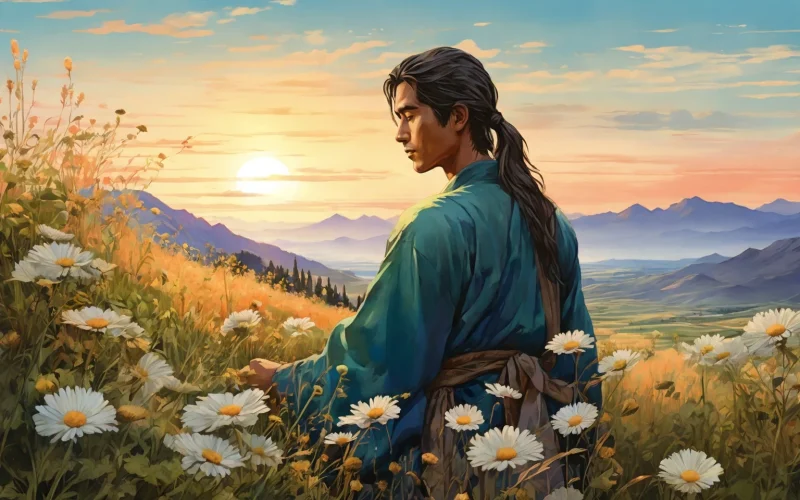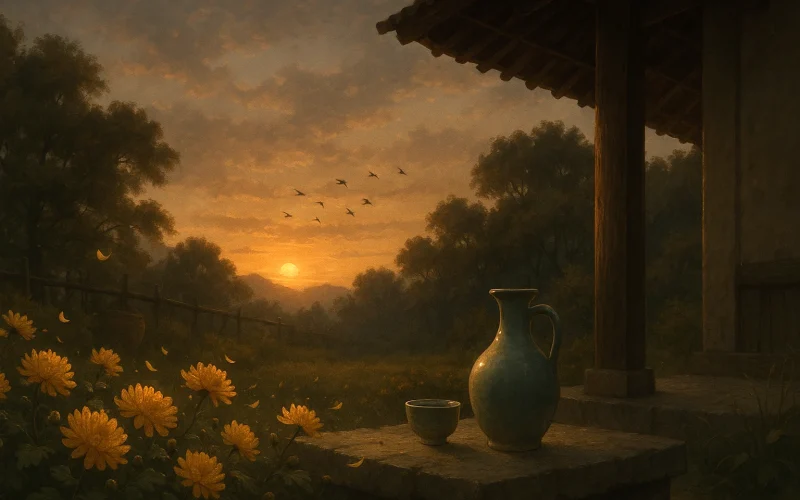In people’s haunt I build my cot,
Of wheel’s and hoof’s noise I hear not.
How can it leave on me no trace?
Secluded heart makes secluded place.
I pick chrysanthemums at will,
Carefree, I see the Southern Hill.
The mountain air is fresh day and night,
Together birds go home in flight.
What revelation at this view?
Words fail me if I try to tell you.
Original Poem
「饮酒 · 其五」
陶渊明
结庐在人境,而无车马喧。
问君何能尔?心远地自偏。
采菊东篱下,悠然见南山。
山气日夕佳,飞鸟相与还。
此中有真意,欲辩已忘言。
Interpretation
This poem was composed around 416 AD during Tao Yuanming's reclusive years after leaving official service. It represents the pinnacle of his pastoral poetry, embodying the philosophical ideal of spiritual transcendence through harmony with nature. The work illustrates how inner serenity can transform ordinary surroundings into a personal paradise, reflecting Tao's fusion of Daoist detachment and Confucian self-cultivation.
First Couplet: "结庐在人境,而无车马喧。"
Jie lu zai ren jing, er wu che ma xuan.
I dwell among mortal men, yet hear no clamor of carts and horses.
The opening establishes the poem's central paradox - physical presence in society coupled with spiritual detachment. The "hut among men" symbolizes conscious engagement with the world, while "no clamor" represents achieved inner peace. This contrast introduces Tao's philosophy that true seclusion begins in the mind rather than physical remoteness.
Second Couplet: "问君何能尔?心远地自偏。"
Wen jun he neng er? Xin yuan di zi pian.
You ask how this can be? The distant heart makes wilderness near.
This philosophical core presents Tao's worldview in distilled form. The rhetorical question invites contemplation, answered by his fundamental principle that mental attitude determines one's relationship to environment. The character 远 (distant) suggests both physical and psychological remove, while 偏 (wilderness) transforms through perception rather than geography.
Third Couplet: "采菊东篱下,悠然见南山。"
Cai ju dong li xia, youran jian nan shan.
Picking chrysanthemums by eastern fence, at leisure I see southern hills.
This iconic image captures the essence of pastoral serenity. The deliberate action of "picking" dissolves into passive "seeing," mirroring the transition from conscious effort to effortless awareness. Southern hills (南山) symbolize permanence and spiritual aspiration in Chinese tradition, appearing not through seeking but through tranquil receptivity.
Fourth Couplet: "山气日夕佳,飞鸟相与还。"
Shan qi ri xi jia, fei niao xiang yu huan.
Mountain mists at dusk turn fair; winging birds return together.
Nature's rhythms mirror spiritual homecoming. The "turning" mists and "returning" birds enact cosmic harmony, with the poet as both observer and participant. Sensory imagery ("mists") combines with motion ("winging") to create dynamic balance, suggesting the interdependence of stillness and movement in enlightenment.
Fifth Couplet: "此中有真意,欲辨已忘言。"
Ci zhong you zhen yi, yu bian yi wang yan.
Here lies essential truth, would explain - but words escape me.
The ineffable climax transcends language. "Essential truth" (真意) exists beyond verbal articulation in the space between chrysanthemums and mountain shadows. The syntactic rupture performs the very forgetting it describes, embodying the Daoist ideal of wordless understanding and the Buddhist concept of intuitive wisdom.
Holistic Appreciation
The poem progresses from physical setting to philosophical statement, through iconic pastoral imagery to ultimate transcendence. Each couplet builds upon the last, creating layers of meaning that culminate in wordless enlightenment. Tao demonstrates how ordinary activities like gardening can become spiritual practice when performed with mindful presence.
Artistic Merits
The poem's supreme achievement lies in its "simple diction conveying profound meaning." Tao Yuanming constructs a world of spiritual-natural harmony using deliberately plain, unadorned language. Structurally, it progresses organically from domestic scenes to philosophical revelation, ultimately arriving at transcendent enlightenment.
Insights
Tao's vision remains profoundly relevant in our hyperconnected world. His poem suggests that peace comes not from fleeing society but from cultivating "distant heart" consciousness. The work invites us to transform our immediate surroundings through mindful presence, finding the extraordinary within the ordinary. This ancient wisdom offers an antidote to modern fragmentation - a reminder that paradise exists wherever we choose to perceive it.
Poem translator
Xu Yuanchong (许渊冲)
About the poet

Tao Yuanming(陶渊明), 365 – 427 CE, was a poet, literary figure, fu writer, and essayist active during the late Eastern Jin and early Liu Song dynasties. Born in Chaisang (near present-day Jiujiang, Jiangxi Province), he pioneered a new genre of pastoral-themed literature, expressing profound philosophical insights through simple language. His poetic style became an enduring aesthetic standard in classical Chinese poetry.











